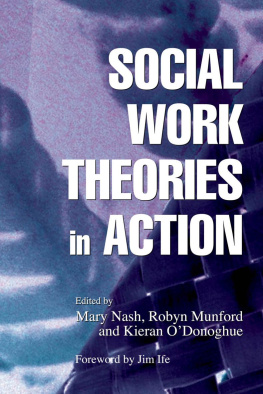Social Work Theories in Action
of related interest
Settlements, Social Change and Community Action
Good Neighbours
Edited by Ruth Gilchrist and Tony Jeffs
ISBN 978 1 85302 764 2
eISBN 978 1 84642 277 5
Learning to Practise Social Work
International Approaches
Edited by Steven M. Shardlow and Mark Doel
ISBN 978 1 85302 763 5
eISBN 978 1 84642 308 6
Spirituality and Social Care
Contributing to Personal and Community Well-being
Edited by Mary Nash and Bruce Stewart
ISBN 978 1 84310 024 9
eISBN 978 1 84642 708 4
Integrating Theory and Practice in Social Work Education
FlorenceWatson, Helen Burrows and Chris Player
With contributions from Lorraine Agu, Simon Shreeve and Lee Durrant
ISBN 978 1 85302 981 3
eISBN 978 1 84642 292 8
The Childs World
Assessing Children in Need
Edited by Jan Horwath
ISBN 978 1 85302 957 8
eISBN 978 0 85700 183 2
Supporting Parents
Messages from Research
David Quinton
Foreword by the Right Honourable Margaret Hodge, Minister for Children, Young People and Families
ISBN 978 1 84310 210 6
The Working of Social Work
Edited by Juliet Cheetham and Mansoor A.F. Kazi
ISBN 978 1 85302 498 6
Social Work Management and Practice
Systems Principles
Second Edition
Andy Bilson and Sue Ross
ISBN 978 1 85302 388 0
eISBN 978 0 85700 114 6
Social Work, Immigration and Asylum
Debates, Dilemmas and Ethical Issues for Social Work and Social Care Practice
Edited by Debra Hayes and Beth Humphries
Foreword by Steve Cohen
ISBN 978 1 84310 194 9
eISBN 978 1 84642 217 1
Handbook of Theory for Practice Teachers in Social Work
Edited by Joyce Lishman
ISBN 978 1 85302 098 8
Social Work Theories in Action
Edited by Mary Nash, Robyn Munford
and Kieran ODonoghue
Foreword by Jim Ife
Jessica Kingsley Publishers
London and Philadelphia
First published in 2005
by Jessica Kingsley Publishers
73 Collier Street
London N1 9BE, UK
and
400 Market Street, Suite 400
Philadelphia, PA 19106, USA
www.jkp.com
Copyright Jessica Kingsley Publishers 2005
Foreword copyright Jim Ife 2005
All rights reserved. No part of this publication may be reproduced in any material form (including photocopying or storing it in any medium by electronic means and whether or not transiently or incidentally to some other use of this publication) without the written permission of the copyright owner except in accordance with the provisions of the Copyright, Designs and Patents Act 1988 or under the terms of a licence issued by the Copyright Licensing Agency Ltd, Saffron House, 610 Kirby Street, London ECIN 8TS. Applications for the copyright owners written permission to reproduce any part of this publication should be addressed to the publisher.
Warning: The doing of an unauthorised act in relation to a copyright work may result in both a civil claim for damages and criminal prosecution.
The right of the contributors to be identified as author of this work has been asserted by them in accordance with the Copyright, Designs and Patents Act 1988.
Library of Congress Cataloging in Publication Data
Social work theories in action / edited by Mary Nash, Robyn Munford, and Kieran ODonoghue ; foreword by Jim Ife.
p. cm.
Includes bibliographical references and index.
ISBN-13: 978-1-84310-249-6 (pbk.)
ISBN-10: 1-84310-249-8 (pbk.)
1. Social serviceAustralia. 2. Social serviceNewZealand. 3. Socialwork with minoritiesAustralia. 4. Social work with minoritiesNew Zealand. I. Nash, Mary, 1946- II. Munford, Robyn. III. ODonoghue, Kieran.
HV473.S634 2005
361.30994dc22
2004030909
British Library Cataloguing in Publication Data
A CIP catalogue record for this book is available from the British Library
ISBN 978 1 84310 249 6
eISBN 978 1 84642 100 6
Contents
Dedications and Acknowledgements
To my family, with love, wonder and admiration for who and what you all are.
To those who taught me social work: academics, clients, students and members of the Aotearoa/New Zealand Association of Social Workers. The work of the contributors and the publishing team is also acknowledged with gratitude.
Mary Nash
I dedicate this book to my family, to those who have gone before and who have influenced the way I see the world and to those who are here today and share both the happy and sad times. Thank you to my parents who have shown me what it means to care for others. To my partner, Garth, and to my sons, Matt and Josh, thank you for keeping me real and reminding me to celebrate the many ordinary, but special moments in our busy days. A special thank you goes to Miha who has been in our life for many years and who has taught me about strengths-based practice and never giving up no matter how hard the journey. Thank you to two special colleagues to Jackie my research partner, thank you for the fun and inspiration. Janet, thanks go to you for the support on a daily level and for making work fun. And to my co-editors it has been a joy working with you and I look forward to the next project. Thank you.
Robyn Munford
To Rosemary, Richard, Rebekah and Dorothy and in memory of Auckland Granddad.
I wish to acknowledge the work of the contributors and the publishing team.
Kieran ODonoghue
Foreword
There is no one right way to do social work. That is the clear message after many years of research, theory, conceptualization and debate. For a long time, social work was caught in the trap of the modernist search for certainty, that there must be one right answer, one best way to do it, or one unified grand theory of everything. Different theories would compete with each other for supremacy. The search for this holy grail has now been recognized as futile. Social work is a human activity, about people working with people. Both the people who do the working (the social workers) and the people with whom they work display the human frailties, contradictions, weaknesses and imperfections that are a part of the human condition; they do not fit a single stereotype, and steadfastly refuse to fit neatly into any of the categories that theoreticians, policy makers and managers try to create for them. In this messy, uncertain and contradictory world, social workers will not all be the same, nor will they all work in the same way, and this is both appropriate and necessary. Diversity of approaches among social workers is more likely to lead to a profession that is able to be responsive to a range of people, and a range of problems.
Moving beyond the idea that there is one right way to do social work, however, does not imply that it is a case of anything goes. There is still good practice and bad practice, or more appropriately, good practices and bad practices. Getting away from the need for the one right answer should not be taken as an excuse for the kind of atheoretical practice that can be characterized as if it feels good, do it. Such practice may indeed feel good, and may at the same time do great harm. There remains a need to understand what makes for good practice in any one circumstance, and for any one social worker. There are competing theories, competing claims for how to do good social work, and the ones that really count are based on a mix of good conceptualizing, research, and practice wisdom. There may not be a single right way to do it, but this does not mean there are no right ways at all; rather there are a number of right ways, ways that will be right for particular workers, in particular contexts.












